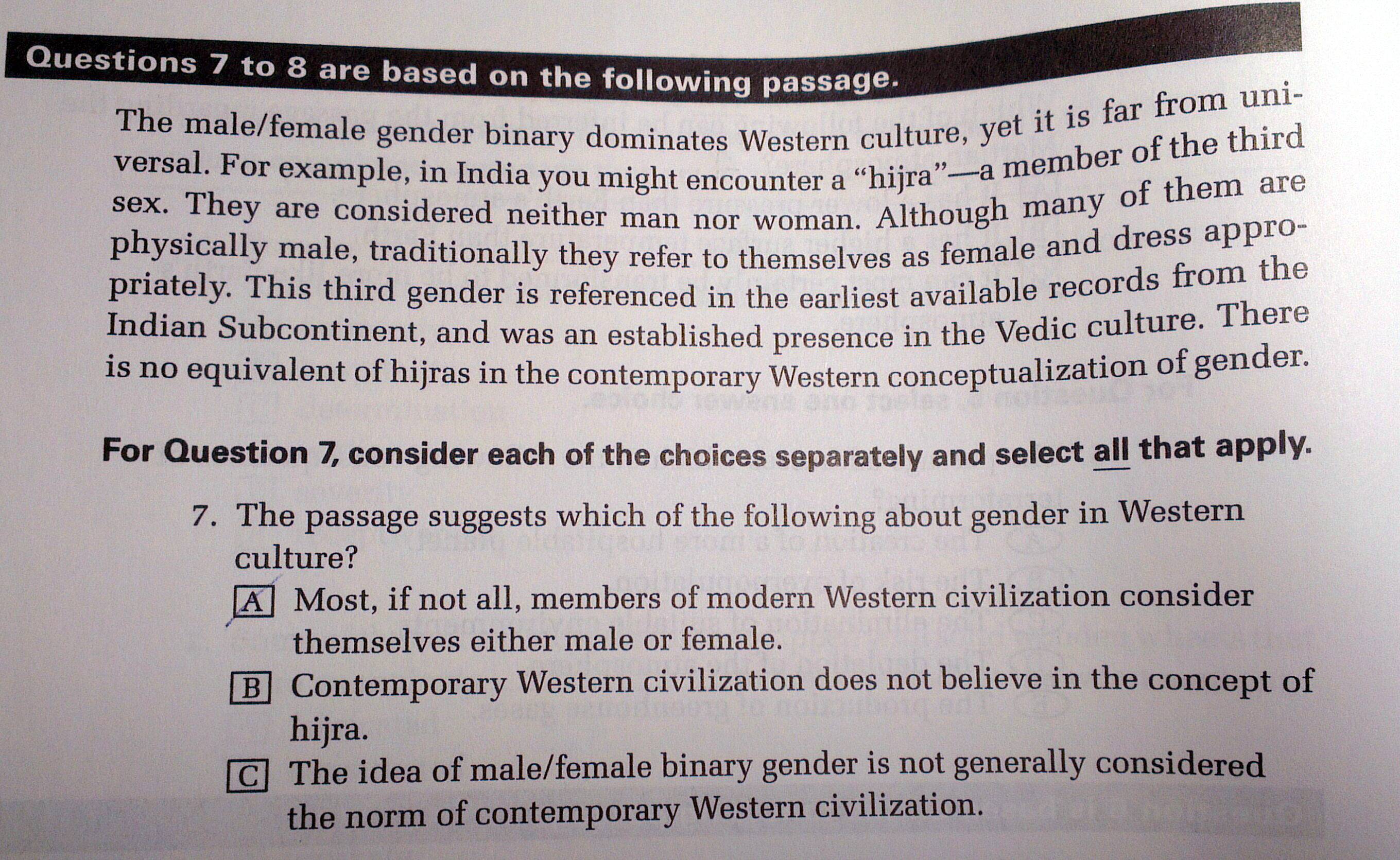There certainly might be an error here, stranger things have happened. But, personally, I am not so sure. Mind you, we are talking about the big bad GRE here. Right? GRE is hard-ass, it sure as Taxes ain't no driver's test or GED business, or ACT and SAT combined, for that matter. So, put we our thinking caps on. Oh Dialexis. And muse.
binary
(b1)
n.
That which is constituted of two figures, things, or parts.
····It is no wonder then why patriarchy clings so fiercely to dualism. The dualism to which patriarchy subscribes is the gender binary. The gender binary as the false dichotomy of “man” and “woman”, serves as patriarchy’s underlying foundation. It is the assumption that only two genders exist in this world, male and female (despite evidence to the contrary). ... The function of patriarchy’s language is to reinforce the gender binary, yet gender (as a binary) is clearly a falsehood. So how does patriarchy succeed in concealing this dualist fantasy? We have considered the fallacy of the gender binary, its patriarchal purpose, and (briefly) the linguistic and intellectual means through which it is sustained. However, we also need to examine the origin of the gender binary within medical discourse. It might seem obvious that the origin of social gender is social. However, that is not what we are led to believe. We are led to believe that this binary is considered natural, and this “fact” of the culture is the key to keeping patriarchy alive. / The gender binary is the artificial division of the world into things that are "masculine" or "for men" and things that are "feminine" or "for women".
(b2)
adj.
Having two equally important parts; related to something with two parts. Compounded or consisting of two things or parts; characterized by two (things).
·····A binary statistical distribution has only two categories. / This theory of binary composition of all chemical compounds, through the union of electro-positive and electro-negative atoms or molecules, was extended by Berzelius.
.
gender, n.
(g1)
[count noun] Another word for sex.
·····the feminine gender. / We all have a gender. / Any flowering plant has both genders.
(g2)
[count noun] Sexual identity, especially in relation to society or culture. The mental analog of sex: one's maleness, femaleness, etc., as seen from their own perspective.
·····Whether it's her personality, her political views, her gender, her sexual orientation, her prior background, or whatever, I don't know (probably differs from person to person). / O'Nan views her gender as an advantage. / I could be wrong, though that's what I heard from a discussion in school from a (female) sociologist (about how society views both genders).
(g3)
[count noun] The members of one or other sex. Females or males considered as a group. All the members of one sex.
·····differences between the genders are encouraged from an early age / expressions used by one gender / the entire male gender
(g4)
[mass noun] The state of being male or female (typically used with reference to social and cultural differences rather than biological ones). A socio-cultural phenomenon that divides people into various categories such as "male" and "female," with each having associated dress, roles, stereotypes, etc.
·····traditional concepts of gender
Now, regarding the excerpt, in "gender binary", we have a noun (b1), modified by another noun (g_), acting as an adjective, and it can be g1, g2, g3 or g4.
In the "this third gender ... was an established presence in the Vedic culture", we have g2.
Finally, in the "Western conceptualization of gender," we have g4.
On the other hand, in the answer C, "binary gender" is a noun (g_), modified by an adjective (b2). Which g is it?
You have all assumed (Edit: actually, not all) it is g4. I say, it is g1 and g2 simultaneously.
In other words, "binary gender"* has an individual as its target, not the society/population on the whole. When they write "the idea of male/female," they mean "the idea that one person can be g1:male and at the same time be g2:female." Well, most certainly is it true that that "is not generally considered a norm of contemporary Western civilization." Yet.
Ergo: A and C are correct. The answer given is not wrong.
Q.E.D.
*A binary gender is a gender that is neither male nor female. It is a third thing. Nevertheless, it is the binarity that makes it the third.


